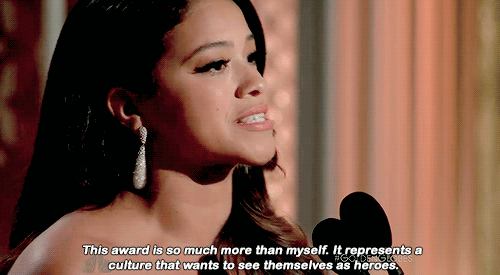When I saw this year’s list of Golden Globe nominees, I was thrilled to see two familiar faces in particular: Aziz Ansari and Gina Rodriguez. Ansari starred in, co-wrote, and produced the new Netflix hit series Master of None, which follows the story of Indian-American Dev Shah. This is his first nomination for a Golden Globe. Rodriguez stars as the lead in the CW show Jane the Virgin, and her portrayal of Venezuelan-American Jane Villanueva won her the Golden Globe last year. Both of these shows are among my favorites because of their punchy one-liners and for their hilarious characters that make me laugh, cry, and feel—and I will always be excited to see the shows and actors I love be recognized for their achievements. However, this year’s nominations for Ansari and Rodriguez held a larger significance for me—it showed recognition for actors showcasing the narratives of second-generation kids, like me.
“Second-generation” refers to the children of immigrants in America, typically the first generation to be born in the U.S., but the second generation to inhabit the country. The demographics of our country are changing rapidly, and we are projected to become a majority-minority nation by 2060 due to high rates of immigration and intermarriage. Given this, the stories and experiences of the second generation will also increase in importance and visibility. Currently, half of the nation’s population under 18 is of a minority racial or ethnic background, and it is still noteworthy and remarkable to see shows like Jane the Virgin and Master of None tell the stories of second-generation kids and receive recognition for it.

Amandla Stenberg, who plays Rue in The Hunger Games, once said, “Existing and thriving as a black woman is a small revolution in itself.” Similarly, existing and thriving as a second-generation kid—torn between being pigeonholed into our native identity and our American identity—is a small revolution in itself. Our stories are constantly appropriated and twisted into stereotypical tropes on television, or are erased altogether. We are either “too Indian, Latina, etc.” or “too white” or “not Asian enough.” There is no room for nuance in our hyphenated identities.

The lack of nuance in storytelling revolving minority characters on TV is attributed to the lack of diversity in writers’ rooms. Despite advances in minority representation on screen, the lack of diversity behind the scenes means minority characters end up being written as stereotyped, one-dimensional tokens that are often underdeveloped, and where race is the sole defining characteristic. Minorities are often relegated to a narrowly defined range of roles: quick cameos for stereotypical comedic relief, or the token character put in a lead role to show “diversity” without actually developing the character in a meaningful way. Ultimately, this has led to the voices and stories of second-generation kids, like myself, to be completely ignored and erased from the entertainment industry. Our complicated, hybrid, hyphenated identity doesn’t fit neatly into preconceived notions of race and place in America, and so instead of taking the time to address our experiences in a way that does their complexity justice, we are just left out of the narrative of mainstream television altogether.
However, one of the great things about Master of None and Jane the Virgin is the diversity of the writers; thus, Ansari and Rodriguez have more control over their characters’ narrative and are treated as multidimensional characters that reflect the second-generation experience realistically. In these shows, as in real life, race isn’t just a “Very Special Episode.” It is a fact of life, and it plays a role in determining our experiences, but is by no means the only or most important determinant of our stories.

By showcasing the experiences of minorities in such a raw and realistic light, without toning it down or whitewashing it to pander to a mainstream audience, and while still maintaining fantastic character development, sharp dialogue, and a great plot across the board, Ansari and Rodriguez are breaking ground for future portrayals of minority characters and second-generation kids. They portray characters that relate to second-generation kids and all other viewers by allowing ourselves to be seen on screen for what we are—nuanced and multidimensional human beings, rather than racialized, stereotypical tropes.
Yes, seeing a first-time win for Ansari and a second win for Rodriguez would speak volumes to second-generation kids. However, regardless of the outcome of this weekend’s awards, the nominations themselves show me that my experiences, and the experiences of other second-generation kids, are finally being heard. And that is a small revolution in itself.
Share this:
- Click to share on Tumblr (Opens in new window)
- Click to share on Twitter (Opens in new window)
- Click to share on Facebook (Opens in new window)
- Click to share on Reddit (Opens in new window)
- Click to email a link to a friend (Opens in new window)
- Click to print (Opens in new window)
- Click to share on Pocket (Opens in new window)
- Click to share on LinkedIn (Opens in new window)
- Click to share on Pinterest (Opens in new window)





